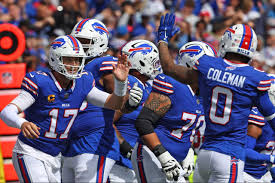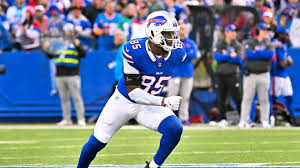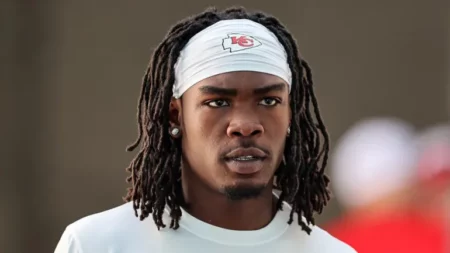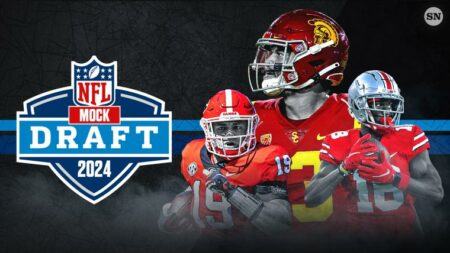Bills’ Draft Strategy Signals Trust in James Cook as Contract Year Looms
The Buffalo Bills’ approach to the 2025 NFL Draft has been a subject of intense scrutiny and analysis. While the team addressed key needs on the defensive side of the ball and added intriguing offensive weapons, one notable absence from their draft haul was a running back. This decision, or rather lack thereof, has sent a clear message: the Buffalo Bills appear to be placing significant faith in their current starting running back, James Cook, as he enters a pivotal contract year. This strategic choice has ignited discussions about the team’s confidence in Cook, their potential plans for his future, and the overall value they place on the running back position in their offensive scheme.
James Cook, the Bills’ second-round pick in the 2022 NFL Draft, has steadily grown into a vital component of their offense. After a somewhat limited role in his rookie season, Cook emerged as the clear lead back in 2024, showcasing his versatility as both a runner and a receiver. His speed, agility, and ability to make plays in space provided a dynamic element to the Bills’ attack. In the 2024 season, Cook rushed for over 1,000 yards and contributed significantly in the passing game with 258 receiving yards and a combined total of 18 touchdowns across the 2024 and 2025 seasons. His performance undoubtedly warranted recognition, earning him a spot in his second Pro Bowl.
Read more:
The NFL and Nike Ignite Passion with “Rivalries” Program: Uniforms Rooted in Community
Buffalo bills 3D shirt ideas for season 2024-2025
Entering the 2025 season, Cook is eligible for a contract extension. The Bills’ decision not to invest draft capital in a running back, especially in the early or middle rounds, strongly suggests they are comfortable with Cook leading their backfield. Had they harbored significant doubts about his long-term future in Buffalo or his ability to handle a full workload, it’s likely they would have added a younger, high-potential player to compete for the starting role or at least provide a strong backup. The absence of such a move indicates a level of trust in Cook’s talent, his work ethic, and his fit within the Bills’ offensive system orchestrated by offensive coordinator Joe Brady.
General Manager Brandon Beane has often emphasized building through the draft and rewarding players who perform well for the organization. Cook has undeniably met those criteria. His growth over the past two seasons, culminating in a productive 2024 campaign, has likely solidified his position as a key player the Bills envision as part of their long-term plans. By not drafting a running back, the Bills are essentially signaling their intent to potentially engage in contract extension talks with Cook, demonstrating their belief in him as their primary ball carrier for the foreseeable future.
However, this strategy is not without its potential risks and raises several questions. The running back position in the NFL can be volatile, with players experiencing varying levels of production and durability throughout their careers. Relying heavily on a player entering a contract year always carries a degree of uncertainty. If Cook were to suffer a significant injury or experience a dip in performance, the Bills’ lack of a high-pedigree backup could become a concern.
Furthermore, the value placed on the running back position across the league is a constant topic of debate. While some teams prioritize investing heavily in top-tier running backs, others have found success utilizing a more committee-based approach or focusing on other offensive positions. The Bills’ decision not to draft a running back could also reflect their overall philosophy on positional value, perhaps prioritizing spending their draft capital on what they deem more premium positions like quarterback, offensive line, and defensive playmakers.
Despite these potential considerations, the message sent by the Bills’ draft strategy regarding James Cook is overwhelmingly positive for the young running back. It signifies that the organization believes in his ability to be a consistent and impactful player in their offense. It suggests they see him as more than just a stopgap and are potentially willing to invest in him as a long-term cornerstone of their ground game.
Looking ahead, the 2025 season will be crucial for both James Cook and the Buffalo Bills. Cook will be playing to secure his future, whether that’s a lucrative extension in Buffalo or a significant contract on the open market. The Bills, in turn, will be looking for Cook to build upon his 2024 success and solidify his role as a reliable and explosive playmaker. The absence of a drafted running back adds an extra layer of importance to Cook’s performance, as the team’s reliance on him will be even more pronounced.
In conclusion, the Buffalo Bills’ decision to bypass drafting a running back in the 2025 NFL Draft speaks volumes about their confidence in James Cook. As he enters his contract year, this strategic choice indicates a strong belief in his talent and potential, and hints at the possibility of the Bills prioritizing a long-term commitment to their lead back. While questions about depth and the overall value of the position remain, the Bills have seemingly placed their trust in Cook to carry the load and be a key contributor to their offensive success in the upcoming season and potentially beyond. This calculated move could prove to be a shrewd investment if Cook continues his upward trajectory, solidifying his place as a foundational piece of the Buffalo Bills’ future.
Hot products about James Cook :

Buy Now : let James Cook BUFFALO BILLS T-Shirt











